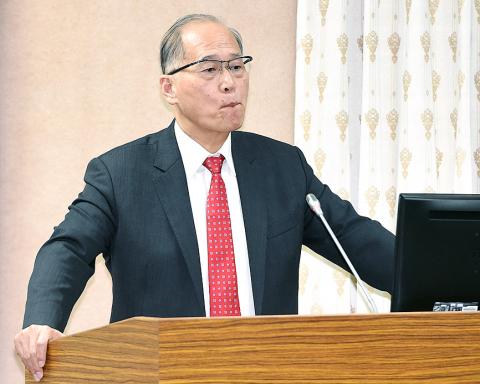Taiwan’s trade office in Nigeria is to be relocated to Lagos within two weeks, Minister of Foreign Affairs David Lee (李大維) said yesterday, after the Nigerian government ordered the office moved out of the capital, Abuja, reportedly due to Chinese pressure.
“Our staff in the mission is packing and will move the office to Lagos later this week or next week,” Lee told reporters on the sidelines of a meeting of the legislature’s Foreign Affairs and National Defense Committee.
Once the relocation is completed, the Ministry of Foreign Affairs (MOFA) is to ask the Nigeria Trade Office in Taiwan to relocate as a retaliatory measure, he said.

Photo: Liao Chen-huei, Taipei Times
The Nigerian government in January ordered Taiwan to move its office, change the name of the office by removing the title “Republic of China (Taiwan)” and reduce its staff.
The Chinese Ministry of Foreign Affairs yesterday lauded the move, saying that it showed Nigeria’s “staunch support” for the “one China” principle that sees Taiwan as part of the People’s Republic of China.
Nigeria on March 31 demanded that office director Morgan Chao (趙家寶) leave the country, saying it could not guarantee his safety.
Chao has since returned to Taiwan.
On June 30, Nigerian military personnel sealed off the office and forced its staff off the premises.
In response, Taiwan twice summoned the acting director of the Nigeria Trade Office in Taipei to protest the African country’s moves against Taiwan’s interests, the ministry said.
Lee yesterday said he is concerned about the nation’s diplomatic relations with Palau, after China seemingly pressured that country and the Vatican into banning their nationals from visiting Taiwan.
Democratic Progressive Party Legislator Chuang Ruei-hsiung (莊瑞雄) and Chinese Nationalist Party (KMT) Legislator Johnny Chiang (江啟臣) cited Beijing’s group tourism embargo on the Vatican and Palau, and asked Lee to comment on China’s intentions and the security of Taiwan’s ties with the two diplomatic allies.
Lee said that he has spent a significant amount of time and energy on Palau.
“I have been been picking my brains about the situation,” he said, adding that MOFA Director-General of East Asia and Pacific Affairs Winston Chen (陳文儀) is dealing with the situation.
While Chinese comprise the largest share of tourists to Palau, the latter country’s diplomatic policy is not solely guided by concerns for its tourism industry, Lee said.
When asked by Chiang how he would grade the Taiwan-Palau relationship on a scale of “red,” “yellow” and “green,” Lee said: “It is between yellow and green.”
Asked by Chuang about the nation’s ties with the Holy See, Lee said: “We have a good grip on it and we are confident.”
The nation’s relationship with Palau has experienced difficulties, but they were unrelated to Beijing’s tourism ban and has stabilized, a source said on condition of anonymity.
However, a reshuffling of the nation’s mission in Palau — led by Ambassador Michael Tseng (曾永光) — might take place soon, the source said.
Regarding the Honduran presidential election on Monday, Lee said that the ruling and opposition parties are running neck-and-neck, adding that the Honduran Supreme Electoral Tribunal is expected to announce the election results today.
The ministry has made contact with, and understands the agendas of, Honduran President Juan Orlando Hernandez and presidential candidate Salvador Nasralla, Lee said.
Additional reporting by CNA

Alain Robert, known as the "French Spider-Man," praised Alex Honnold as exceptionally well-prepared after the US climber completed a free solo ascent of Taipei 101 yesterday. Robert said Honnold's ascent of the 508m-tall skyscraper in just more than one-and-a-half hours without using safety ropes or equipment was a remarkable achievement. "This is my life," he said in an interview conducted in French, adding that he liked the feeling of being "on the edge of danger." The 63-year-old Frenchman climbed Taipei 101 using ropes in December 2004, taking about four hours to reach the top. On a one-to-10 scale of difficulty, Robert said Taipei 101

Nipah virus infection is to be officially listed as a category 5 notifiable infectious disease in Taiwan in March, while clinical treatment guidelines are being formulated, the Centers for Disease Control (CDC) said yesterday. With Nipah infections being reported in other countries and considering its relatively high fatality rate, the centers on Jan. 16 announced that it would be listed as a notifiable infectious disease to bolster the nation’s systematic early warning system and increase public awareness, the CDC said. Bangladesh reported four fatal cases last year in separate districts, with three linked to raw date palm sap consumption, CDC Epidemic Intelligence

US climber Alex Honnold left Taiwan this morning a day after completing a free-solo ascent of Taipei 101, a feat that drew cheers from onlookers and gained widespread international attention. Honnold yesterday scaled the 101-story skyscraper without a rope or safety harness. The climb — the highest urban free-solo ascent ever attempted — took just more than 90 minutes and was streamed live on Netflix. It was covered by major international news outlets including CNN, the New York Times, the Guardian and the Wall Street Journal. As Honnold prepared to leave Taiwan today, he attracted a crowd when he and his wife, Sanni,

Taiwanese and US defense groups are collaborating to introduce deployable, semi-autonomous manufacturing systems for drones and components in a boost to the nation’s supply chain resilience. Taiwan’s G-Tech Optroelectronics Corp subsidiary GTOC and the US’ Aerkomm Inc on Friday announced an agreement with fellow US-based Firestorm Lab to adopt the latter’s xCell, a technology featuring 3D printers fitted in 6.1m container units. The systems enable aerial platforms and parts to be produced in high volumes from dispersed nodes capable of rapid redeployment, to minimize the risk of enemy strikes and to meet field requirements, they said. Firestorm chief technology officer Ian Muceus said